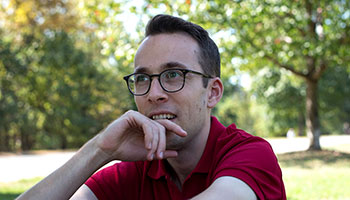Faculty Spotlight: Roel Tempelaar

By Irena Garic
Roel Tempelaar, born and raised in the Netherlands, obtained his B.S. from the University of Groningen in 2009. In 2015, he obtained his Ph.D. from the University of Groningen, defending his thesis on the coherent and spectral properties of photosynthetic complexes and organic materials. During his graduate years, he has had regular visits to Frank Spano's lab at Temple University, Philadelphia. The past four years Roel spent at Columbia University as a postdoctoral fellow in David Reichman’s lab. Roel joined our Department in January 2020 as an Assistant Professor of Chemistry.
What inspired you to pursue Theoretical Chemistry?
Ten years ago I would not have guessed I would be a theoretical chemist today. I very much identified as a theoretical physicist, taking courses such as quantum field theory and subatomic physics. But when I started being involved in scientific research I was immediately drawn to chemistry and materials-oriented topics. It was there that I saw a large variety of interesting problems where I could make a significant contribution. A particular aspect that I have been fond of in this field is the close connection with experimental studies. Northwestern Chemistry is a great department in this regard, with a longstanding tradition of theoretical-experimental collaborations.
Tells us more about how your career path led you to Northwestern University?
After graduating at the University of Groningen there was much to be said for continuing my scientific career in Europe. However, I have been excited about the academic environment in the US ever since I visited Temple University to perform graduate research with Frank Spano. So when David Reichman at Columbia University offered me a postdoc position I gladly accepted. These years at Columbia have been extremely fulfilling, and afterward, I decided to apply for faculty positions in the US. My interview at Northwestern was a very exciting experience, and I was happy to find out that the enthusiasm was mutual.
What are your current research interests / projects and tell us a little bit about that?
Theoretical chemistry textbooks tend to start out with the Born-Oppenheimer approximation (decoupling the electronic and nuclear motion), and then continue to build upon that. Indeed, most traditional theoretical chemistry approaches are based on that approximation. Over recent years, however, it has become clear that the coupling between electronic and nuclear motion is crucial to explain a series of important phenomena in nature and technology. The problem, however, is that describing this coupling is computationally extremely demanding. I am currently developing various techniques that enable us to improve upon the Born-Oppenheimer approximation without blowing up our computers, based on a variety of tricks. This will soon allow us to look into fascinating phenomena such as natural light-harvesting with much-improved accuracy.
Do you have any advice for young researchers considering a career in academia?
I am not sure if I am sufficiently seasoned to give solid advice, but what I can tell is that I have always thoroughly enjoyed performing scientific research, and I believe that this enjoyment is a requisite for scientific progress. It triggers creativity. So my advice is to bear that in mind even though the career path itself may become increasingly competitive.
What is one thing not on your CV that you would like us to know?
I have at some point seriously considered becoming a professional jazz pianist, and have continued to play during my postdoctoral years in New York. That has been a particularly exciting time for me, as New York has a tremendous jazz scene, offering me the opportunity to meet and play with some phenomenal musicians. The Chicago area is not bad either in that respect, I've been told.
